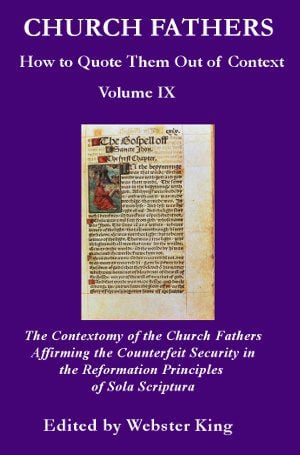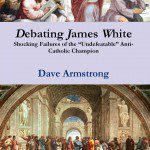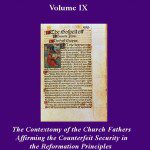David T. King and William Webster are anti-Catholic Protestant polemicists who have been very active in opposing the Catholic Church. I have written in the past, twice about William Webster’s gross ignorance regarding the concept and definition of development of doctrine, and twice about his solely self-published books (including the present three-volume work under consideration).
David T. King, likewise, was exceedingly ignorant about Blessed John Henry Cardinal Newman: claiming that he was a modernist who believed in evolution (heretical notion) rather than development (orthodox notion) of doctrines. I quickly disabused him of that fairy tale. I’ve also refuted his claim that St. John Chrysostom and St. Irenaeus were proponents of sola Scriptura and have three other papers about his foolishness and antics on my Anti-Catholicism web page. None of these have ever been replied to by King, Webster, or any other anti-Catholic.
I’ll be devoting a series to the three-volume set of King and Webster, entitled, Holy Scripture: The Ground and Pillar of Our Faith; in particular, their historical arguments, in Volume II (subtitled, “An Historical Defense of the Reformation Principle of Sola Scriptura” — William Webster), and Volume III (subtitled, “The Writings of the Church Fathers Affirming the Reformation Principle of Sola Scriptura” — Webster and King).
The set was self-published (Battle Ground, Washington: Christian Resources Inc.) in 2001. For a withering critique of it, see Phil Porvaznik’s delightful article, “Holy Scripture Volume IV: The Ground and Pillar of Whose Faith? (or what William Webster and David King don’t tell you)”.
This series will be devoted to exposing the unsavory tactics of (I must say) ultimately intellectually dishonest, sophistical citations of the Church fathers: a thing — sadly — very common in less scholarly Protestant circles from the very beginning. I’ve written many times about this (see examples on my Church Fathers page), including several examinations of John Calvin’s “patristic distortions” in my first book devoted to him. King and Webster engage in the same timeworn, cynical, many-times-refuted tactics.
To start, let’s be sure to present exactly what it is the authors / editors are contending for. All effective critiques must always nail down matters of definition and goals in the work being scrutinized. A Foreword by the King of the anti-Catholics, James White (to whom I have just devoted a book-length refutation), appears in the first two volumes. Mr. White writes:
The doctrine of sola Scriptura is a divinely given bulwark against error and the traditions of men. It teaches us that Scripture is the sole infallible rule of faith for the Church. . . .
Responding directly and forcefully to those of the Roman Church who press flawed, illogical, un-scriptural, and a-historical arguments upon a gullible audience, Webster and King demonstrate the truth of sola Scriptura through sound and knowledgeable exegesis of the text of Scripture and the writings of the early Christians. (Vol. I, 11-12)
King gets in his shots, too, in his Introduction to Vol. I:
In this work, we intend to prove that Roman apologists have misrepresented and manipulated the truth of Scripture, the facts of history, the writings of the Church Fathers and what the Reformers believed and taught regarding sola Scriptura. (Vol. I, 20)
In his Introduction to Vol. II, Webster pontifi—, er, opined:
. . . Scripture is both materially and formally sufficient. The reformers argued that the Church is not infallible but that all tradition and teaching must be subject to the final authority of Scripture. Scripture is the sole and final arbiter of truth, infallible and the ultimate authority. (Vol. II, 17)
. . . we will examine what the Church fathers taught about Scripture and tradition. We will find that the Reformers were correct in claiming patristic support for the principle of sola Scriptura . . . It is the Roman Catholic teaching on tradition and authority which is unbiblical and unhistorical. (Vol. II, 18)
The Introduction of Vol. III (no author given: both men edited this volume) focuses in on the Church fathers:
The Reformers insisted that Scripture was the ultimate authority for the Church and . . . that Scripture alone was . . . the only infallible rule of faith. . . .
When they [the Church fathers] are allowed to speak for themselves it becomes clear that they universally taught sola Scriptura in the fullest sense of the term embracing both the material and formal sufficiency of Scripture. This is clearly revealed by statements, such as the following, which are found repeatedly in their writings:
1) Scripture is the sole source of doctrine for the faith of the Church.
2) All doctrines necessary for salvation and moral living for the Christian are contained in Scripture.
3.) All doctrines must be proven from Scripture.
4.) What the Apostles taught orally has been handed down in Scripture.
5.) Scripture is the ultimate judge in all controversies.
6.) Scripture is the ultimate and supreme authority for the Church.
7.) If Scripture is silent on an issue it cannot be known.
8.) All teachers and councils are subject to the authority of Scripture.
9.) Any bishop or teacher who teaches doctrines that are not contained in Scripture or are contradictory to Scripture is to be rejected.
10.) Scripture reveals clearly and plainly all truths necessary for salvation and moral living.
11.) Scripture interprets Scripture, i.e., it is self-interpreting.
12.) The Holy Spirit reveals truth and gives understanding of Scripture directly to those who pray and walk in obedience.
. . . it is the Reformation principle of sola Scriptura which [is] true to the ancient faith and practice of the Church and that it is, in fact, the Roman Catholic Church which has misrepresented the Church fathers . . . (Vol. III, 9-10)
I submit that when readers see how Webster and King systematically, selectively prooftext the fathers and ignore hundreds of other statements of theirs that don’t fit into their preconceived Protestant notions of authority (superimposed anachronistically back onto the fathers), that a very different picture will emerge, and that the fathers will be shown to be — as always — quite profoundly consistent with Catholic teaching with regard to the question of authority, tradition, Church, and Scripture (i.e., the rule of faith) that is the focus of the three-volume set.
I’ve already demonstrated this in a trilogy of books devoted to Catholic distinctives in the Church fathers, and in, e.g., a very in-depth debate on the fathers and sola Scriptura with anti-Catholic apologist Jason Engwer. Now I will demonstrate how the attempt to establish the exact opposite (i.e., supposed Protestant distinctives in the fathers specifically in relation to the all-important question of authority and the rule of faith) fails miserably and is based on intellectually dishonest, highly selective use of quotations, to the exclusion of other highly relevant ones that don’t fit into the preconceived (anti-Catholic / absurdly tendentious) “talking points.”
I will show repeatedly how the citations presented prove nothing of what is claimed for them (or that we already agree, so that a quotation is a moot point with regard to Protestant-Catholic disputes), and how others that are omitted directly contradict sola Scriptura itself, and various tenets that comprise or surround it: particularly the twelve points above.














